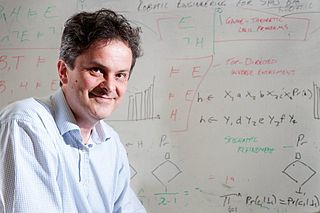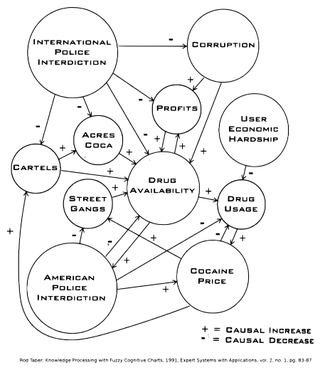 |
| Information mapping |
|---|
| Topics and fields |
| Node–link approaches |
|
| See also |
Brian R. Gaines (born c. 1938) is a British scientist, engineer, and Professor Emeritus at the University of Calgary. [1]
 |
| Information mapping |
|---|
| Topics and fields |
| Node–link approaches |
|
| See also |
Brian R. Gaines (born c. 1938) is a British scientist, engineer, and Professor Emeritus at the University of Calgary. [1]
Gaines received his Bachelor of Arts, Master of Arts and Doctor of Philosophy from Trinity College, Cambridge, and he is a Chartered Engineer, and Chartered Psychologist. [1]
His previous positions include Professor of Industrial Engineering at the University of Toronto, Technical Director and Deputy Chairman of the Monotype Corporation, and Chairman of the Department of Electrical Engineering Science at the University of Essex. He was formerly Killam Memorial Research Professor, Dean of Graduate Studies, Associate Vice-president (Research) and Director of the Knowledge Science Institute at the University of Calgary.
He was president of the Society for General Systems Research in 1979. He is Fellow of the Institution of Electrical Engineers, the British Computer Society and the British Psychological Society.
He has been editor of the International Journal of Human-Computer Studies and of Knowledge Acquisition, and of the Computers and People and the Knowledge-Based Systems book series. [1]
Gaines' research interests have included modelling the socioeconomic infrastructure of information technology, human–computer interaction, cognitive psychology, and systems theory. [2]
Gaines is one of the pioneers in what is known as stochastic computing , a term he used first to characterise the highly attractive field when working at the Standard Telephones and Cables Ltd. (STL) in search of computational processors capable of learning during the 1960s. [3]
Guy André Boy said of Gaines' role in the development of the field of knowledge acquisition:
In the 1980s a kind of artificial intelligence was developed that was founded on so-called knowledge-based systems and more specifically expert systems. Alongside this methods and tools were developed for acquiring knowledge and making it explicit based on experts in a field. Bryan Gaines [sic] and the Banff school had a big part to play in this scientific and technical field. The aim was to rationalize expert knowledge in order to make it operational within computerized databases. [4]
He has authored over 450 papers and authored or edited at least 11 books on a wide variety of aspects of computer and human systems. [5] His books include:
In artificial intelligence, an expert system is a computer system emulating the decision-making ability of a human expert. Expert systems are designed to solve complex problems by reasoning through bodies of knowledge, represented mainly as if–then rules rather than through conventional procedural code. The first expert systems were created in the 1970s and then proliferated in the 1980s. Expert systems were among the first truly successful forms of artificial intelligence (AI) software. An expert system is divided into two subsystems: the inference engine and the knowledge base. The knowledge base represents facts and rules. The inference engine applies the rules to the known facts to deduce new facts. Inference engines can also include explanation and debugging abilities.
Natural-language understanding (NLU) or natural-language interpretation (NLI) is a subtopic of natural-language processing in artificial intelligence that deals with machine reading comprehension. Natural-language understanding is considered an AI-hard problem.
Within personality psychology, personal construct theory (PCT) or personal construct psychology (PCP) is a theory of personality and cognition developed by the American psychologist George Kelly in the 1950s. The theory addresses the psychological reasons for actions. Kelly proposed that individuals can be psychologically evaluated according to similarity–dissimilarity poles, which he called personal constructs. The theory is considered by some psychologists as forerunner to theories of cognitive therapy.

The repertory grid is an interviewing technique which uses nonparametric factor analysis to determine an idiographic measure of personality. It was devised by George Kelly in around 1955 and is based on his personal construct theory of personality.
The expression computational intelligence (CI) usually refers to the ability of a computer to learn a specific task from data or experimental observation. Even though it is commonly considered a synonym of soft computing, there is still no commonly accepted definition of computational intelligence.

Mathematical psychology is an approach to psychological research that is based on mathematical modeling of perceptual, thought, cognitive and motor processes, and on the establishment of law-like rules that relate quantifiable stimulus characteristics with quantifiable behavior. The mathematical approach is used with the goal of deriving hypotheses that are more exact and thus yield stricter empirical validations. There are five major research areas in mathematical psychology: learning and memory, perception and psychophysics, choice and decision-making, language and thinking, and measurement and scaling.

Stephen H. Muggleton FBCS, FIET, FAAAI, FECCAI, FSB, FREng is Professor of Machine Learning and Head of the Computational Bioinformatics Laboratory at Imperial College London.

A fuzzy cognitive map (FCM) is a cognitive map within which the relations between the elements of a "mental landscape" can be used to compute the "strength of impact" of these elements. Fuzzy cognitive maps were introduced by Bart Kosko. Robert Axelrod introduced cognitive maps as a formal way of representing social scientific knowledge and modeling decision making in social and political systems, then brought in the computation.
Bruce Howard McCormick (1928–2007) was an American computer scientist, Emeritus Professor at the Department of Computer Science, and founding director of the Brain Networks Lab at Texas A&M University.
Knowledge retrieval seeks to return information in a structured form, consistent with human cognitive processes as opposed to simple lists of data items. It draws on a range of fields including epistemology, cognitive psychology, cognitive neuroscience, logic and inference, machine learning and knowledge discovery, linguistics, and information technology.
Thomas Robert Gruber is an American computer scientist, inventor, and entrepreneur with a focus on systems for knowledge sharing and collective intelligence. He did foundational work in ontology engineering and is well known for his definition of ontologies in the context of artificial intelligence.
Gennady Simeonovich Osipov was a Russian scientist, holding a Ph.D. and a Dr. Sci. in theoretical computer science, information technologies and artificial intelligence. He was the vice-president of the Institute for Systems Analysis of the Russian Academy of Sciences, professor at the Moscow Institute of Physics and Technology, and at Bauman Moscow State Technical University. Osipov has contributed to the Theory of Dynamic Intelligent Systems and heterogeneous semantic networks used in applied intelligent systems.
Anil K. Jain was an Indian-American electrical engineer and Professor of the Department of Electrical Engineering and Computer Science at the University of California, Davis, known for his contributions on "two-dimensional stochastic models for images provided a firm theoretical foundation for a number of algorithms of spectral analysis, adaptive image estimation and image data compression", including work on transform coding for image compression and block-based motion compensation for video compression in particular.
Paul Compton is an Emeritus Professor at the University of New South Wales (UNSW). He was also the former Head of the UNSW School of Computer Science and Engineering. He is known for proposing "ripple-down rules".
Adrian David Walker is a US Computer Scientist, born in London, England.

Francesca Rossi is an Italian computer scientist, currently working at the IBM T.J. Watson Research Lab as an IBM Fellow and the IBM AI Ethics Global Leader.
This glossary of artificial intelligence is a list of definitions of terms and concepts relevant to the study of artificial intelligence, its sub-disciplines, and related fields. Related glossaries include Glossary of computer science, Glossary of robotics, and Glossary of machine vision.

The following outline is provided as an overview of and topical guide to machine learning. Machine learning is a subfield of soft computing within computer science that evolved from the study of pattern recognition and computational learning theory in artificial intelligence. In 1959, Arthur Samuel defined machine learning as a "field of study that gives computers the ability to learn without being explicitly programmed". Machine learning explores the study and construction of algorithms that can learn from and make predictions on data. Such algorithms operate by building a model from an example training set of input observations in order to make data-driven predictions or decisions expressed as outputs, rather than following strictly static program instructions.